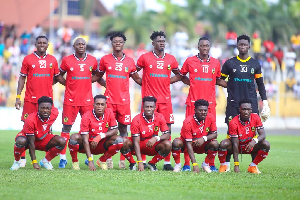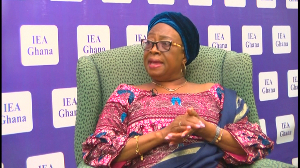A former Vice Chancellor of the University of Education, Winneba (UEW), Professor Akwasi Asabere-Ameyaw, has said academic programmes must be restructured with their missions redefined to train the kind of graduates needed by the labour market.
He said the Universities were over producing graduates for sectors, which were already choked and the economy had not expanded to absorb the overflow - a situation that concerned most Ghanaians.
Prof Asabere-Ameyaw was delivering the Second N.K. Eyeson Lectures, in honour of Professor Emeritus Kodwo Ndzeba Eyeson, who has taught at the University of Cape Coast for more than 37 years.
The Lectures, organised by the School of Biological Sciences of the University of Cape Coast, was under the theme, “Academia-Industry Synergy: The Way Forward”
Prof Asabere-Ameyaw said for universities to remain focused on their set missions, the Government and other major stakeholders would have to provide the needed resources to run their defined programmes effectively and efficiently.
Otherwise, he said, they would deviate in their attempt to generate funds to keep them functioning.
He underscored the importance of universities to the socio -economic development of the country, saying that, the universities apart from providing quality education, were also tasked with the production and consolidation of ethical values and personal values in students.
They were also to turn out flexible personalities who could readily adjust to changing circumstances to remain functional and relevant to themselves and to society.
Prof Asabere-Ameyaw, who is also a Science educator, said there was the need for the country to use higher education and a technical skills system to generate adequate manpower with the requisite skills for all sectors of the economy.
He, however, expressed concern that university education in the country faced a number of challenges, including reduced funding, increased operational costs, large class sizes, demands by industry for well-seasoned graduates and rapid advances in technology, saying these had made it difficult to meet the demands of the society.
On the academia and industry collaboration, he stated that the activities of universities should be catalytic to national advancement, promote social change and sow seeds of sustainable nation building.
He, therefore, advocated that universities communicated with industries and come out with constructive measures to bridge the gap between academia and industry.
He also suggested the formation of symbiotic partnerships between selected industries and faculty members through projects with advisory boards to facilitate collaborative efforts; and also to provide logistical support to the collaborators.
Prof Eyeson said the institution of the lectures indicated the School’s appreciation of his hard work and asked the University authorities to desist from only giving posthumous and recognise and appreciate the hard work of people whiles they were alive.
He said though the University had awarded Honorary Degrees, the beneficiaries had been mainly outsiders, with the few insiders being past Vice Chancellors.
He said it was unfortunate that consideration was not given to other staffs of the University.
Prof George Kweku Toku Oduro, the Pro-Vice Chancellor of UCC, commended the College for acknowledging the hard work of Prof Eyeson with the institution of the lecture.
He said it was important to reward hard work and announced that the UCC had setup a committee to identify staffs to be given honorary degrees.
Prof Asabere-Ameyaw and Dr Rose Ntreh, both past students of Prof Eyeson, were honoured with citation.
Regional News of Tuesday, 10 May 2016
Source: GNA
















